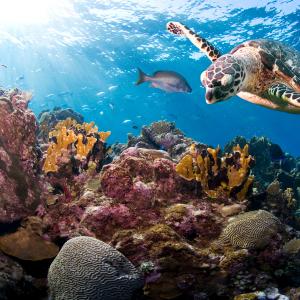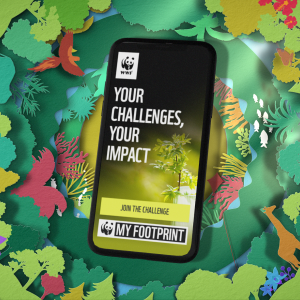2025 hasn’t been easy for our natural world. But there have been moments of hope.
With your support, WWF has been working with governments, businesses, and communities in the UK and across the world to drive action to protect and restore our natural world. More people than ever before – people like you – are helping to protect and restore our one shared home.
Together we can bring our world back to life.
Thanks to your support in 2025, we’re:

Advocating for the High Seas
In September 2025, after 20 years in the making, the 60th nation ratified the High Seas Treaty, marking a turning point for ocean protection and restoration.
The treaty will provide a legal framework and a clear process for creating networks of marine protected areas in international waters. Working for nearly two decades, WWF helped shape the treaty to make sure it will benefit nature.

Safeguarding rhinos
In Kenya, WWF supports the training of rhino monitors to give them the skills needed to protect critically endangered black rhinos. This focuses on rhino monitoring and reporting.
With funding from WWF-UK, 170 rhino monitors received training in Kenya in 2025.

Protecting the elusive snow leopard
In April 2025, Nepal achieved a conservation milestone by announcing its first-ever national snow leopard population estimate using a robust methodology – a historic moment for this incredible big cat that we still know so little about.
The new estimate is 397 wild snow leopards in Nepal. This follows years of collaboration between WWF-Nepal, government agencies, and communities, with funding support from WWF-UK and other partners.

Using AI to prevent fires and deforestation
WWF-Bolivia is implementing the cutting-edge Forest Foresight tool which uses satellite imagery and AI to predict and prevent fires and deforestation. This helps stop damage before it’s too late, protecting the forests that jaguars call home.
In 2025, Forest Foresight was used across 3.3 million hectares within the protected areas of Santa Cruz. Based on its success, it will be scaled up to be used across three more areas, including Guarayos – the area with the highest rate of deforestation in Bolivia.

Conducting Saltmarsh science
In May 2025, WWF and Aviva unveiled pioneering research about saltmarshes, which showed that these coastal habitats are enormous carbon stores! That means they’re a vital part of the fight against climate change.
Using findings from the UK’s first ‘carbon flux tower’, a solar-powered tower that continuously measures the exchange of carbon dioxide between the saltmarsh and atmosphere, research shows that protecting nature isn’t just good for the planet – it’s essential for our future.

Planting trees around the world
Throughout 2025, thanks to the Trillion Trees ReForest Fund, our partner teams have restored nearly 186,000 trees.
This magnificent achievement has taken place across 13 landscapes, spanning Latin America and Mesoamerica to Africa and Asia, and is benefitting over 5,800 people.
These trees could absorb nearly 127,000 tonnes of carbon as they grow over the next 20 years.

Helping otters in Nepal
With funding from the UK Government’s Darwin Initiative, WWF is leading a project to help otter populations in Nepal.
The project aims to reduce threats to otters while strengthening the livelihoods of Indigenous communities such as the Sonaha who depend on the river in the Lower Karnali Watershed.
Over the last year, illegal and destructive fishing has declined by 50% in the area where the project is taking place.

Supporting tigers in India
With support from WWF-UK, WWF-India is working with the Chhattisgarh Forest Department to help tiger numbers increase while supporting local communities.
The latest survey results, released in August 2025, revealed a new total of 10 resident tigers. This is double the number recorded in the previous survey in 2018.

Restoring mangroves
WWF has teamed up with the Red Cross, with support from People’s Postcode Lottery, to restore 900 hectares of freshwater and mangrove habitats in Lamu, Kenya.
Planting mangrove seedlings began in June 2025. Since then, over 33,000 seedlings have been planted across 10 hectares (around 14 football pitches!) in the Mkunumbi area of the Lamu Southern Swamp, exceeding the target of 25,000.

Helping turtles bounce back
For 15 years, WWF has collaborated with communities called Dau ni Vonu to monitor and protect marine turtles in Fiji.
Thanks to conservation efforts like those of WWF-Pacific and the Dau ni Vonu in Fiji, in October 2025, green turtles were reclassified from ‘endangered’ to ‘least concern’ on the IUCN global list of threatened species.
Will you join us?
Whether you’ve made changes in your own life, donated, marched, signed petitions or used your voice to influence others – you are part of a positive movement for our world that’s needed now more than ever before.
Nature is in freefall. That’s why we’re urgently tackling the underlying causes that are driving the decline – especially the food system and climate change. And we’re finding solutions, so future generations have a world with thriving habitats and wildlife. It’s a huge challenge, but there is hope. Through our global network we’re working with governments, companies, communities and others who have the will to act and the power to transform our world. We’re using our groundbreaking scientific research, our global influence, and the backing of our many supporters to make sure the natural world’s vital signs are recovering by 2030.
There are reasons for hope, and we’ve seen what can be achieved when we work together. But we can’t do it without you.
Join us and help bring our world back to life.
 Ways to help our world in 2025
Ways to help our world in 2025
 Adopt an animal
Adopt an animal
 Download WWF's My Footprint app
Download WWF's My Footprint app
 A Prescription For Nature
A Prescription For Nature